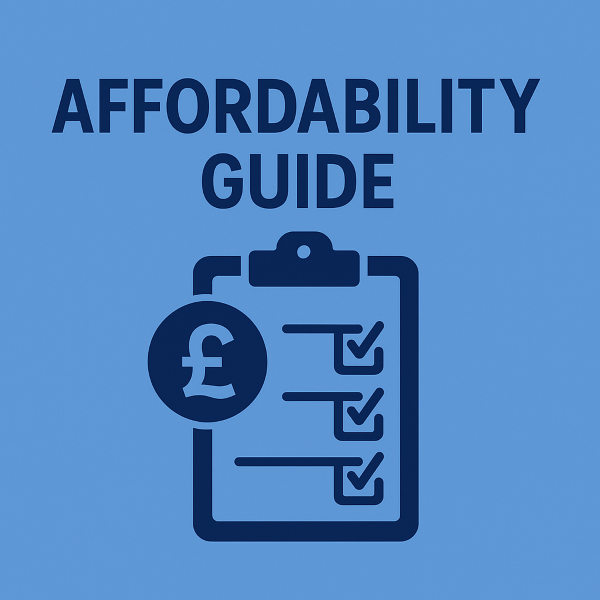Affordability Guide | Understanding Mortgage Affordability. Mortgage affordability explains how much you can borrow based on your financial situation. This affordability guide explains how lenders evaluate your income, spending, debts, and credit history when considering a mortgage offer. Lenders use this information to check if you can manage the required monthly payments. They also test your finances at higher interest rates to confirm long-term stability.
Understanding these checks helps you prepare your application before submission. This guide also explains how to improve your borrowing power through simple financial steps.
Use this information before speaking with a qualified mortgage adviser. Good preparation improves your chances of securing a suitable mortgage.
What Mortgage Affordability Means
Mortgage affordability means your ability to meet monthly payments without financial pressure. Lenders check if your income can support the requested mortgage amount. They also test your payments at higher interest rates. This helps lenders confirm your ability to manage future financial changes.
How Lenders Calculate Affordability
Income Checks
Lenders review your basic pay, bonuses, overtime, benefits, and other sources of income. Stable income often increases your borrowing power.
Debt and Credit Commitments
Lenders examine loans, credit cards, finance plans, and overdrafts. Higher debts reduce affordability and borrowing potential.
Living Costs and Household Spending
Lenders consider regular spending such as food, childcare, insurance, and transport. High living costs reduce the amount you can borrow.
Credit History Review
Good credit history improves lender confidence in your application. A poor credit history reduces lender confidence and can limit the available deals.
Stress Testing and Why It Matters
Lenders test your payments at higher interest rates. This protects you if rates increase in the future. The test helps lenders check your ability to manage payment changes.
Passing this test strengthens your mortgage application. It also shows lenders that your finances are stable under pressure.
You can prepare for this test by reviewing your credit score, improving your income checks, and speaking with a mortgage adviser for guidance.
Factors That Reduce Affordability
-
High monthly debt payments
-
Irregular income patterns
-
Poor credit history
-
High everyday spending
-
Large financial commitments
-
Short employment history
How to Improve Your Mortgage Affordability
| Improvement Area | What to Do | Why It Helps |
|---|---|---|
| Reduce Your Outstanding Debts | Pay off credit cards and small loans when possible. | Lower debts increase borrowing power and improve approval chances. |
| Improve Your Credit Score | Check your credit report for errors and update missing information. Pay bills on time to strengthen your score. | A strong credit profile increases lender confidence and boosts affordability. |
| Lower Your Monthly Spending | Review your budget and cut non-essential costs. Maintain a stable spending pattern before applying. | Lower spending increases disposable income and improves lender assessments. |
| Increase Your Deposit | Save a larger deposit to reduce the loan amount you need. | A larger deposit increases affordability and may unlock better mortgage deals. |
| Prepare Your Documents Early | Gather payslips, bank statements, identification, and proof of income. Organise all documents in a secure folder. Check statements for transparent transactions and update personal details when needed. Use our affordability calculator to see how your documents may influence your borrowing power. | Clear and complete documents support accurate affordability checks. Good organisation speeds up your application and reduces delays. |
When Mortgage Advice Is Most Valuable
Mortgage advice is most valuable when your financial decisions carry a long-term impact. A mortgage adviser can explain lender rules in simple terms that support confident choices.
First-time buyers benefit from guidance because lenders use strict criteria for new applicants. Expert advice helps buyers understand income checks, deposit needs, and credit expectations.
Self-employed applicants often face complex affordability rules. Advisers can analyse accounts, tax returns, and income patterns to support a stronger application. They can also explain which lenders accept variable income and irregular payment structures. Mortgage advice is also helpful for clients with poor credit history. A skilled adviser can review your credit profile and suggest ways to improve your chances. They can also identify lenders who accept past credit issues.
Professional advice increases your chances of finding suitable mortgage deals. It also ensures your application matches lender requirements before submission. Using a qualified adviser can reduce stress and save valuable time during the process. Find an adviser through our Mortgage Broker Directory for expert support.
Thank you for reading our publication “How to Find a Mortgage Broker | Expert Mortgage Brokers.” Stay “Connect“-ed for more updates soon!
Common Questions About Affordability
| Question | Answer |
|---|---|
| How much can I borrow for a mortgage | You can borrow a multiple of your income. Most lenders offer four to five times your income. Your credit, spending, and debts affect the final amount. |
| Does my credit score affect affordability? | Yes. A higher credit score increases affordability. A low score can reduce lender confidence and limit options. |
| Does my job type affect my ability to borrow? | Yes. Lenders check job stability and income patterns. Self-employed applicants may need extra documents. |
| Can I improve affordability before I apply | Yes. Reduce debts, save a larger deposit, and manage spending. These steps increase your borrowing power. |

